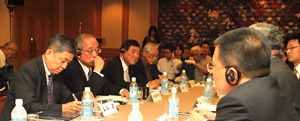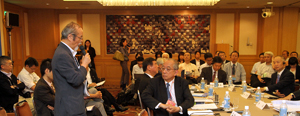Prominent opinion leaders from Japan and China shared identical views at a Tokyo forum in early July on the advisability of shelving the territorial dispute over a number of tiny islets in the East China Sea.

They also agreed that all-out efforts must be made on both sides to avert military confrontations stemming from the territorial dispute over the Senkaku Islands, known as the Diaoyu Islands in China, which have been effectively controlled by Japan since 1895.
A dozen Japanese and Chinese experts on diplomatic and security affairs, mostly diplomats, former high-level military officers and scholars, conducted fierce and heated discussions on the bilateral territorial issue at the subsession for security issues at the eighth Tokyo-Beijing Forum in Tokyo on July 2.
The Japanese panelists included former Defense Minister Shigeru Ishiba, a senior leader of the conservative Liberal Democratic Party, who is touted as one of the most likely candidates to be Japan's next prime minister; Kazuhiko Togo, a former director general of the Foreign Ministry's International Legal Affairs Bureau and currently director of the Institute for World Affairs at Kyoto Sangyo University; former Japanese Ambassador to China Yuji Miyamoto, who served as moderator at the subsession; and Noboru Yamaguchi, a professor at the National Defense Academy of Japan.
The Chinese experts included Rear Admiral Yang Yi, former director of the Institute for Strategic Studies at the People's Liberation Army National Defense University; Huang Xingyuan, secretary general of the Chinese People's Institute of Foreign Affairs; Li Wei, head of the Institute of Japanese Studies at the Chinese Academy of Social Sciences; and Wu Jinan, a senior researcher with the Shanghai Institute for International Studies.
During the four-hour-plus discussion, both sides showed few signs of making concessions as regards each's insistence on the sovereignty of the disputed islands. At the same time, the Japanese and Chinese delegations expressed understanding that a sovereign country could never compromise over a territorial issue.
For instance, Masahiro Akiyama, former administrative vice minister of the Defense Agency (now Defense Ministry) and currently president of the Tokyo Foundation, a major policy research institute, argued that historically and in terms of international laws, Japan can hardly admit the existence of the territorial dispute over the Senkaku Islands.
Meanwhile, the Chinese participants insisted that China had first discovered the islets and named them the Diaoyu during the days of the Ming Dynasty (1368-1644), much earlier than the birth of "modern nation-states."
Despite the immeasurable gulf in their fundamental positions on the issue, the Japanese and Chinese participants shared a sense of crisis and urgency in institutionalizing measures to prevent the territorial dispute from developing into military conflict or warfare between the two neighboring countries.
Yang Yi of China said half-jokingly that he would like to see the islands be submerged in the wake of a big earthquake so that the bilateral territorial dispute would disappear overnight.
Ishiba of Japan said, "We had better stop arguing about who owns the islands. Rather, we should seriously discuss how to prevent military confrontations at sea, set up hot lines and build mutual trust."
The former defense minister proposed that the concerned authorities in both countries should set up "hot lines" to prepare for any contingency in the disputed waters, adding that Japan for its part would reinforce the patrol capability of the Japanese Coast Guard.
Togo of Japan referred to late Chinese leader Deng Xiaoping's political decision, which he made during his official visit to Japan in 1978, to "leave the problem to the next generation who will have greater wisdom."
"Regrettably, no wise idea has been forwarded (from either side) since then. It is high time that we launched a thorough dialogue to share wisdom," he said.
In response, Yi said that both countries could emulate the relations between France and Germany. "France and Germany fought 50 years ago, and now they are the two engines of the integration of Europe. China and Japan could become the two engines of an 'Asian Union' in another 50 years and in this process, there will be no need to identify the territory," he said.

Specific measures, suggested by the Japanese and Chinese participants to control risks of confrontation, are the establishment of a buffer zone in the disputed waters, the launch of joint patrols, bilateral cooperation in maritime rescue operations, direct contact between maritime law enforcement agencies, exchanges between the two countries' armed forces, mutual visits of naval vessels, joint U.N. peacekeeping activities in areas outside of Asia, and the formation of a trilateral dialogue on security affairs involving the United States, among others.
Post a comment